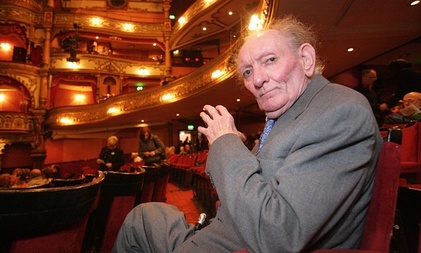|
Sorry to see that acclaimed Irish playwright Brian Friel died today at the age of 86. He was one of my favorite playwrights and often used extremely inventive stagecraft to get across his stories. His best-known work is probably Dancing at Lughnasa, written in 1990, and made into a film starring Meryl Streep. It also won the Tony Award as Best Play. (As it happens, a production is scheduled to open in Dublin next week.) However it was his 1964 play, Philadelphia, Here I Come, which brought him to attention in the U.S., and whose inventiveness leaped out to me even as a little kid. The play told the story of a young man, Gar, leaving Ireland for Philadelphia, but was told with two actors playing the character on stage at the same time, Inner Gar and Outer Gar, so the audience saw what was happening on the surface, but also emotionally (and often with much humor) what was going on beneath. It also was made into a film, which can be saved on Netflix, though isn't available yet in the service, but I'm sure it can be tracked down elsewhere. I don't recall seeing it, and while it's likely well-worth it, I suspect that the theatrical style of the play makes it much more effective on stage than as a movie. Here's a brief scene from the movie, as Gar comes with his girlfriend (and inner self) to try and ask her father for permission to marry before he leaves. However, his 1980 play Translations may have fascinated me even more for its extremely clever storytelling technique. I loved the play, but what also fascinated me is that I saw it in a tiny 150-seat theater in Los Angeles around 1982 though it hadn't yet played on Broadway -- and wonderful as it was, it didn't get a Broadway production until 1995, starring Brian Dennehy. Friel always insisted that Translations is "a play about language and only about language," though it tells so much more. However it's that use of language which is what sets it about so vibrantly. (It was a result of the production that Friel and actor Stephen Rea (best-known for his Oscar-nominated performance in The Crying Game) co-founded the Field Day Theatre Company in Derry, Northern Ireland. Rea also starred in that original production of Translations.) The story is set in the late 1800s when England is ruling Northern Ireland and in the process of changing over the language from Irish to English. The extremely clever stage-conceit is that when characters speak in an Irish accent, that means they're talking Irish, and when speaking in a British accent, they are conversely speaking English. And so, a roomful of character can be talking at each other, arguing, agreeing, trying to bridge gaps, but can't understand one another -- yet the audience can. When two characters are ready to cause a rift and tear things apart, you almost wanted to leap up and shout, "Don't you understand, you two agree with each other, you're so close." This is most impactful when dealing with a Romeo-and-Juliet type love story between a local Irish girl and a British soldier. It's clear to everyone in the audience how deeply they love each other and how much they have in common and want to be together, but their inability understand the other and having the innate uncertainty and distrust between the cultures and those around them pulling at them only creates frustrating and at times heartbreaking barriers. It's a wonderful play. And I'm glad it finally made it to Broadway. And Brian Friel, who wrote so much more than just this, was a wonderful writer. We'll end with the dancing scene from the film of Dancing at Lunghasa. There's no dialogue here -- and why the person who posted it called this the "funniest" scene in the movie is beyond me, since it's not particularly funny (a wee bit so in context), but just joyous -- however, it's as wonderful way to go out and salute Brian Friel as anything. The old man you'll see is the befuddled uncle, played by the great Michael Gambon, and the young boy is based on Brian Friel, with the story being a memoir.
0 Comments
Leave a Reply. |
AuthorRobert J. Elisberg is a political commentator, screenwriter, novelist, tech writer and also some other things that I just tend to keep forgetting. Feedspot Badge of Honor
Archives
June 2024
Categories
All
|
|
© Copyright Robert J. Elisberg 2024
|







 RSS Feed
RSS Feed